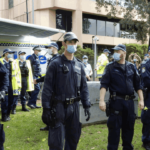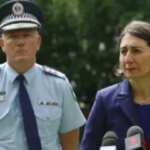Supreme Court of NSW Declares COVID-19 Fines to Be Invalid

On 14 July 2022, three plaintiffs, Rohan Pank, Brenden Beame and and Teal Els, filed challenges in the Supreme Court of New South Wales against penalty notices (a form of fines) issued to them for allegedly failing to comply with a public health order.
The challenges were based on the fact the fines were not sufficiently particularised; in other words, the conduct alleged was not specific enough to meet the requirements of the Fines Act 1996 (NSW) as they merely recorded:
- “Fail to comply with noticed direction in relation section 7/8/9 – COVID-19 – individual” (for Rohan Pank and Brenden Beame), and
- “Unlawfully participate in outdoor public gathering – area of concern – individual” (for Teal Els).
The actions were filed after Revenue NSW refused to withdraw the fines after a review.
Last year’s decision
The matters were set to come before the Supreme Court of NSW on 29 December 2022 but, on the morning of the hearing, Revenue NSW withdrew the penalty notice issued to Mr Pank after conceding it was unlawful due to the insufficiency of the particularisation.
The penalty notices issued to Mr Beame and Ms Els came before the court for later that day, at which time the judge agreed with the submissions of the plaintiffs’ lawyers and declared both fines to be invalid.
The upshot of last year’s decision
Following the landmark decision, Revenue NSW released a statement conceding that as the Commissioner of Fines Administration was unable to review just over 33,000 of the 62,000 Covid fines issued during 2020 and 2021, those fines – equating to more than half of all Covid fines issued during the period – would be withdrawn.
Pressure to withdraw remaining Covid fines
The government came under pressure at the time to withdraw the remaining fines, but it steadfastly refused to do so.
But after a declaratory judgement issued by the Supreme Court earlier this week, the government may need to accede to the pressure or face a tsunami of lawsuits by those unlawfully issued with Covid fines – whether or not those fine have been paid.
The recent judgement
Despite the court having found the remaining two fines in the mentioned case to be invalid – and Revenue NSW having conceded the same – the plaintiffs sought a declaratory judgement fleshing out the precise reasons for the invalidity– which could potentially be used as a precedent in other cases.
On Thursday, 6 April 2023, Supreme Court Justice Dina Yehia SC delivered just that in the decision of Beame; Els v Commissioner of Police & Ors [2023] NSWSC 347.
In the judgement, her Honour note that section 20 of the Fines Act provides as follows:
“A penalty notice is a notice issued under a statutory provision to the effect that—
(a) the person to whom the notice is issued has committed the penalty notice offence specified in the notice, and
(b) if the person does not wish to have the matter determined by a court, the person may pay, within the time and to the person specified in the notice, the amount for the offence specified in the notice.”
Penalty notice must be clear and unambiguous
This means that for a penalty notice to be valid, it must specify a particular offence. Her Honour found that the notices before the court did not meet this requirement to the standard required by the legislation.
“84. In respect of s 20 of the Fines Act, the statutory context and purpose favours an interpretation whereby the penalty notice offence must be clearly and unambiguously specified in the notice itself. Providing information that gives the recipient a clue or an indication from which they might be able to deduce or infer (using material outside the notice) the penalty notice offence is not sufficient”, her Honour found, adding later in the judgement:
“102. … The use of the word “specified” in s 20 of the Fines Act imports a level of clarity and unambiguity that may not be achieved by a short description identifying the substance of the offence. Indeed, this is precisely what happened in the present cases. A short description was included on each of the subject notices, a description which, in each case, is conceded to fall short of complying with section 20 of the Fines Act.”
Penalty notices issued to Els and Beame did not comply with the requirements
Her Honour proceeded to make clear that the penalty notices issued to the remaining plaintiffs did not comply with the Fines Act.
In that regard, her decision states as follows:
“Why were the Two Notices in this Case Invalid?
109 . The Els penalty notice, describes the penalty notice offence as “unlawfully participate in outdoor public gathering – area of concern – Individual”. The Beame penalty notice describes the penalty notice offence as “Fail to comply with noticed direction in relation to section 7/8/9 – COVID-19 – Individual”. The defendants concede, in each case, that the description is so vague that it renders the notice invalid.
110. In each case, the short description identifying the substance of the penalty notice offence was clearly insufficient and did not comply with s 20 of the Fines Act.
111. The description in the Els penalty notice does not correctly identify any of the elements prescribed by the offence-creating provision, namely s 10 of the Public Health Act (PHA). That section provides that:
“10 Offence not to comply with Ministerial direction
A person who—
(a) is subject to a direction under section 7, 8 or 9, and
(b) has notice of the direction,
must not, without reasonable excuse, fail to comply with the direction.
Maximum penalty—
(a) in the case of an individual—100 penalty units, or imprisonment for 6 months, or both, and, in the case of a continuing offence, a further 50 penalty units for each day the offence continues, or
(b) in the case of a corporation—500 penalty units and, in the case of a continuing offence, a further 250 penalty units for each day the offence continues.”
112. The offence in s 10 (“offence not to comply with Ministerial direction”) includes the following elements:
- a Ministerial direction under s 7, 8 or 9 of the PHA;
- a person being subject to the direction;
- that person having notice of the direction; and
- failing to comply with the direction;
- in the absence of a reasonable excuse for non-compliance.
113.The Els penalty notice not only failed to identify the offence-creating provision; it did not correctly identify a single element of the offence.
114. In the Beame penalty notice, the offence is also apparently pursuant to s 10 of the PHA. The offence-creating provision is not identified, nor are the relevant elements of the offence identified correctly. Insofar as the notice refers to “a direction in relation to s 7/8/9 – COVID-19”, it does not refer to the PHA.
115. It is clear from the words of s 10 that the offence created therein has no apparent relationship to what is described in the subject notices.”
A problem for the New South Wales government
Significantly, her Honour made clear the decision can have broader ramifications for government in so far as those who had been issued with, and who paid, invalid penalty notices could similarly seek declaratory relief through the court.
And while the parties in the present case agree to pay their own legal costs (in that regard, they were successfully represented by Redfern Legal Centre), there is nothing to prevent others from seeking legal costs in respect of their legal proceedings.
Her Honour did this by setting out the fact that section 22A(2) of the Fines Act provides that that:
“Payment under a penalty notice is not to be regarded as an admission of liability for the purpose of, and does not in any way affect or prejudice, any civil claim, action or proceeding arising out of the same occurrence.”
That being so, the payment of a fine does not prevent a person from commencing a civil claim against the issuer.
This essentially makes clear the floodgates are potentially open for anyone who may wish to seek declaratory relief from the court.
Pressure to withdraw remaining fines
In that context, perhaps the NSW government would be well-advised to withdraw outstanding Covid fines, and offer those who have already paid such fines a full refund.
The alternative is the state is seen as one that thumbs its nose at the rule of law by enforcing unlawful fines, and could face a tsunami of court cases , causing further delays in the court system and unnecessarily costing the state’s taxpayers millions of dollars in legal fees.






